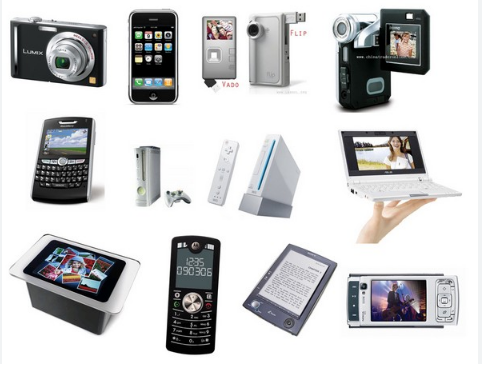
Life Without Gadgets
People born before the 1980’s would very well relate to life before the information age, when people had no access to internet or personal gadgets. Let's briefly walk down the memory lane to relive those moments — a life without gadgets.
Children played together outdoor — they had a lot of physical activity. People talked to each other more often, and verbal communication face-face was at its peak. Chat jargon did not exist, and people knew their spellings well, as they read more books. People enjoyed spending more time outdoors with family and friends. It was commonplace to get the news from newspaper or radio. Entertainment came from playing board games, playing sports, going to the movies, watching VHS tapes, etc. Writers often used either a typewriter or a word processor on their computer. Computers were expensive and bulky. Doing research was hard; frequent visits to the library or scouring through plethora of papers, books, etc. were necessary. Communication was slow.
Life With Gadgets
Gadgets equipped with internet have transformed our lives in several ways and brought about a paradigm shift in our dependence on technology to perform key tasks in our everyday routine. To highlight a few:
- Enormous amount of information at our fingertips
- Use Google Maps to get directions, watch YouTube videos to learn to cook, sing, draw, learn science, etc.
- Health monitoring apps on the cell phone that would remind people to walk, run, bike, check BP periodically, etc.
- Capability to share daily life or special events instantly with thousands of people and see reaction in a matter of minutes, if not seconds
- Expedited research with access to information galore
- Ability to watch videos on demand from anywhere (Netflix, Amazon, etc.)
- Ability to read e-books online on demand — no more visits to library needed
- Use of mobile phones, tablets as pacifiers for kids
- Improved speed of communication by orders of magnitude leading to faster decision-making
- Existence of mobile apps for entertainment, social interaction through digital media, paying bills, accessing bank accounts, etc. (virtually for any purpose)
While there have been advantages to this information age and gadget revolution, it has created an insatiable appetite for information. It's now an expectation that information be readily available on demand from anywhere. This is the age of instant gratification. While technology has fostered the human race, does our current consumption pattern adversely impact our analytical and creative abilities, lead to loss of focus in communication and make us just indexers of data rather than bearers of knowledge? Are we addicted to our gadgets? Let's find out.
Effects of Gadget Addiction
While the business model of the top few app companies hinges on people spending more time with their gadgets every day, we need to recognize that the most important fallout of this induced behavior would be the rising epidemic of gadget addiction. A sense of urge to use the phone or any other gadget when bored or idle equates to addiction. Gadget addiction doesn't discriminate who is affected, it affects all age groups and people of all races. The effects range from mental, physical, emotional to even threatening our democracy.
Mental and Emotional Health
Dopamine is a neurochemical that largely controls the pleasure and reward centers of the brain. High levels of dopamine are usually associated with motivation and excitement to fulfil goals that would lead to recognized rewards and thus reinforcement of a sense of pleasure while achieving those goals. Procrastination, lack of enthusiasm and self-confidence, and boredom are linked to low levels of dopamine.
Research has shown that the brain gets “rewired” as excessive amounts of dopamine get released in the body on frequent interaction with a rewarding stimulus, i.e., using a smartphone app like Facebook. Boredom triggers an interaction with the rewarding stimulus (Facebook app), which in turn results in wide variety of rewards in the form of likes, messages, photos, etc. causing high releases of dopamine in the body. Frequent cycles such as these cause the brain’s receptors to become more insensitive to dopamine, causing the body to experience less pleasure than before for the same natural reward. This leads the person down a spiral, where one has increased craving for the same reward to achieve normal levels of pleasure. If the increased craving cannot be satisfied, it would lead to anxiety, lack of motivation and depression. Gadget addiction is likened to addiction to alcohol or drugs since it results in similar negative consequences.
Studies have shown that children's cognitive and emotional development can be adversely impacted by internet/gadget addiction. More screen time means more virtual interactions and rewards through social media (shares, likes) and less face time. Less face-to-face interaction with other people results in lack of empathy for fellow human beings. As social media glorify picture-perfect lives and well-toned physiques, children’s self-esteem and self-confidence are eroded. Lack of focus and more distraction during conversations is another expected negative impact. A study on China high school students demonstrated that children with moderate to severe risk of internet addiction are more than twice as likely to develop depressive symptoms than addiction-free counterparts.
Technology and gadgets would have become an integral part of human lifestyle and will only continue to increase with years to come. The form factors of gadgets and how humans interact with them may change. However, fundamentally as a human society we should continue to be aware and make sure we do live a fulfilling life by not becoming addicted to machines and continue to emphasize and cherish the human connection in our lives.
Tarikh Input: 17/11/2022 | Kemaskini: 22/10/2024 | aslamiah
PERKONGSIAN MEDIA




























